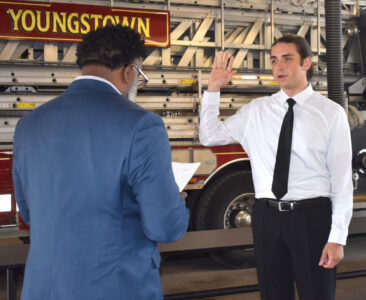Commissioners consider solar, wind farm policy

Correspondent photo / Sean Barron Hundreds of Mahoning County residents and township trustees attended a public hearing that commissioners hosted Thursday at the Mill Creek MetroParks’ Farm in Canfield. The session was to hear comments regarding a possible extended ban on solar and wind farms in most of the townships.
CANFIELD — For Debbie Woodford, the benefits of constructing a large-scale, sustainable wind farm and solar facilities extend beyond her.
“It’s about the children,” Woodford, of Austintown, said. “Our children deserve clean soil, air and water. And the energy is free from the sun.”
Woodford was among those who spoke in favor of the form of energy during the public comments portion of a special town hall meeting Mahoning County commissioners hosted Thursday evening at the Mill Creek MetroParks Farm, 7574 Columbiana-Canfield Road.
The one-hour hearing, which more than 100 people attended, was to gather residents’ input about the possibility of expanding a prohibition on building economically significant wind farms, large wind farms or large solar facilities for generating power in unincorporated areas of Austintown, Beaver, Berlin, Canfield, Coitsville, Goshen, Jackson, Milton, Poland and Springfield townships.
Last November, commissioners banned such projects in Green Township, at the request of its trustees.
The townships that didn’t express interest in banning the projects were Boardman, Ellsworth and Smith. It would be nearly impossible to build a solar and wind farm in Boardman anyway, township administrator Jason R. Loree said, because the area lacks the acreage that would be required for it.
Woodford denounced what she sees as misinformation pertaining to dangerous chemicals in some wind panels, and with runoff water some say such a farm would produce. In addition, others who oppose solar farms say it leads to trash and other types of blight, yet the smoke from last summer’s wildfires in Canada — the product largely of climate change — was far worse, she said.
Also, Ohio ranks 41st in the nation as a renewable energy producer, Woodford continued.
Echoing her view was Lynn Anderson of Youngstown, who said it makes no sense to ban clean and renewable forms of energy while continuing to rely on fossil fuels in the midst of a climate crisis. She also took issue with Ohio Senate Bill 52, which, in effect, provides new powers to county commissioners over certain renewable energy developments.
Also speaking in favor of the technologies was Wayne Greier of Green Township, who owns 675 acres on Washingtonville Road, and who had said the ban essentially killed the possibility of the project going forward on his property.
At Thursday’s meeting, Greier blasted what he feels is too much fearmongering surrounding installing solar and wind farms. A far better approach would be to have unbiased experts assess them on a case-by-case basis, he said.
Standing in stark opposition to such projects was Wayne Anderson of Canfield, whose Raccoon Road farm was established in 1809 and for which he’s a sixth-generation family member operating it.
“My biggest opposition to this is taking productive farmland from food to energy production. Once it’s gone, you’re never going to get it back,” Anderson said.
In addition, the relatively high number of cloudy days in northeast Ohio makes setting up a solar and wind farm impractical. This kind of project would be a better fit in states such as Arizona and Nevada, which have more sunny days and far more sparsely populated and developed land, he said.
“I feel a strong obligation to my ancestors to preserve this farm for agricultural use,” Anderson said.
A Berlin Center man stated three reasons he opposes the technology are the high cost of removing trash at the end of the project’s life cycle, homeowners being forced to absorb the cost of such removals while seeing a decrease in their property values and the “mess from visual pollution” it would create.
Possible runoff water was another concern a few people voiced in favor of the extended ban.
A few other residents who spoke seemed to take more of a middle-of-the-road approach, saying they don’t oppose solar energy installations per se.
Those who espoused such views said they feel it should be studied in greater detail to ascertain what works and what doesn’t, and that this is merely the wrong time and place for it.
An Austintown man said he believes greater research and development needs to go into it “before we walk away from fossil fuels.”
Commissioners took no action after the meeting.
Commissioner Anthony T. Traficanti said that a decision will be made in the near future.
He also noted that each of the county’s 14 townships have unique needs and characteristics, so it would be unfair to conduct a ban arbitrarily.



